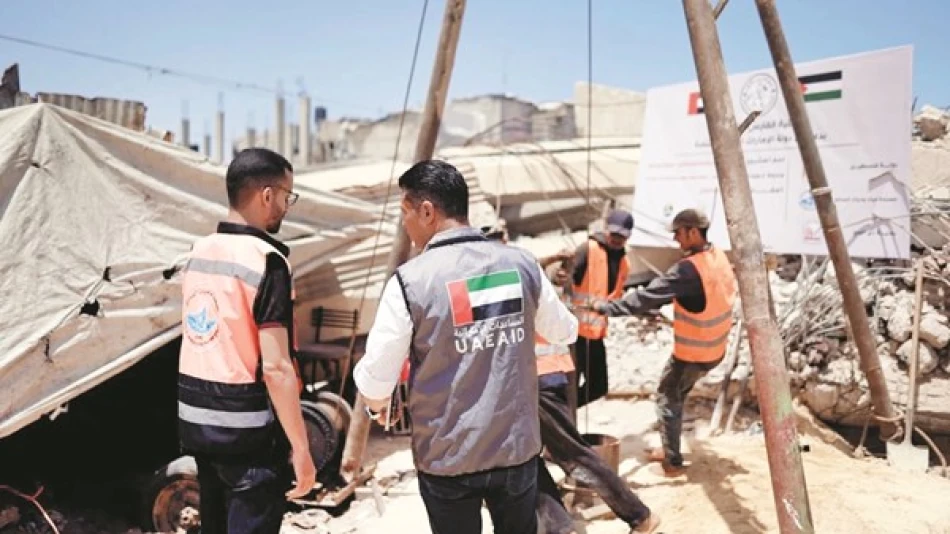
UAE Steadfastly Supports Gaza Residents' Resilience
UAE's Gaza Aid Campaign Emerges as Strategic Soft Power Play Amid Regional Crisis
The United Arab Emirates has positioned itself as a leading humanitarian force in the Gaza crisis through comprehensive relief operations that extend far beyond traditional aid packages. Regional experts argue that the UAE's sustained support—encompassing field hospitals, water desalination plants, medical supplies, and food assistance—reflects both genuine humanitarian commitment and calculated soft power diplomacy that strengthens its regional influence while addressing an unprecedented crisis.
Beyond Emergency Relief: UAE's Integrated Approach
Unlike conventional aid efforts that focus primarily on immediate needs, the UAE has deployed what analysts describe as a "comprehensive relief ecosystem" in Gaza. The initiative includes constructing field hospitals, establishing continuous air and land bridges for supply delivery, and providing specialized medical equipment alongside basic necessities.
Hani Al-Jamal, a researcher in international and regional affairs, emphasized that this approach represents a dual-purpose strategy combining ethical obligations with political positioning. "The UAE's role in Gaza extends beyond material or food support to integrated relief projects," he noted, highlighting how the nation has created sustainable infrastructure rather than merely distributing emergency supplies.
Strategic Timing and Regional Leadership
The UAE's intervention comes at a critical juncture when Gaza's healthcare system has collapsed and basic life necessities have become scarce amid widespread displacement and infrastructure destruction. This timing allows the Emirates to fill a leadership vacuum in regional humanitarian response, potentially reshaping its diplomatic relationships across the Middle East.
Soft Power Dividends in a Fragmented Region
Political researcher Nourhan Sharara argues that the Gaza aid campaign reinforces the UAE's position as a regional and global hub for humanitarian and developmental work. This aligns with the Emirates' broader strategy of establishing itself as a stabilizing force in crisis zones, similar to its previous interventions in Yemen, Syria, and Lebanon.
The approach mirrors successful soft power strategies employed by other regional powers, such as Qatar's humanitarian diplomacy during the Arab Spring or Turkey's aid operations across Africa and the Middle East. However, the UAE's model appears more focused on infrastructure development rather than purely political influence.
Unconditional Aid as Diplomatic Asset
Dr. Tayseer Abu Jumaa, a political science professor at Palestine University, stressed that UAE support remains "unconditional and stems from humanitarian duty," distinguishing it from aid programs that carry explicit political strings. This positioning potentially enhances the UAE's credibility as a mediator in future regional conflicts.
Market and Regional Implications
The UAE's humanitarian leadership in Gaza serves multiple strategic objectives beyond immediate crisis response. First, it strengthens relationships with Palestinian leadership and civil society, potentially opening future economic and diplomatic opportunities. Second, it demonstrates the Emirates' capacity for rapid, large-scale humanitarian deployment—a valuable asset for international partnerships.
This approach also contrasts sharply with other regional powers that have offered primarily rhetorical support, positioning the UAE as a pragmatic alternative to ideologically-driven regional actors. The strategy could prove particularly valuable as Middle Eastern nations navigate post-conflict reconstruction opportunities.
Long-term Strategic Positioning
By establishing sustainable humanitarian infrastructure rather than temporary relief measures, the UAE is creating lasting presence and influence in Palestinian territories. This mirrors successful Chinese and Turkish models of combining humanitarian aid with long-term strategic positioning, though adapted to the Emirates' specific regional objectives and capabilities.
The Gaza operation also serves as a demonstration of UAE humanitarian capacity for international partners, potentially strengthening its position in global humanitarian coordination mechanisms and multilateral organizations where soft power influence translates into concrete diplomatic advantages.
Most Viewed News

 Layla Al Mansoori
Layla Al Mansoori






